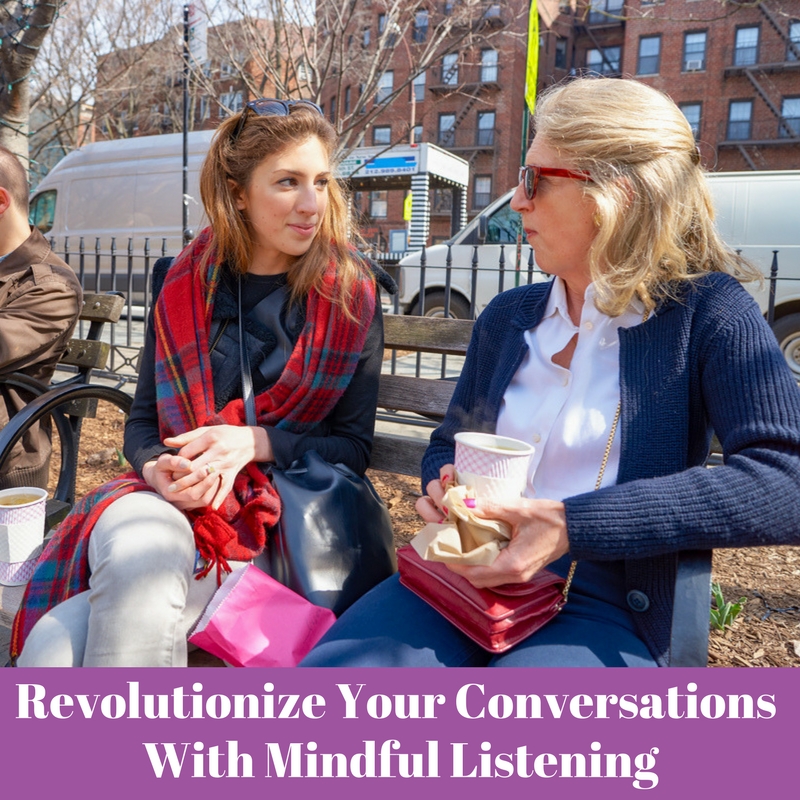
Have you ever been talking to someone only to feel as if they aren’t really listening to you? Do their thoughts seem to wander when you talk, only to interrupt you to get their thoughts into the conversation?
Or how about you. Do you ever find yourself in a conversation with a friend or partner, or sitting in a meeting at work and realize you have no idea what was just said? For the average person, this happens more often than we’d like to admit, perhaps more than once every day. You might even be interested in what’s being said but your mind has carried you into the past or future, to something that’s bothering you, or to your to-do list.
Listening seems like a natural skill that we all do, but not everyone remains present when someone else is talking. The most common thing for most of us to do is to start to think of our response instead of fully listening to what the other person is saying.
Thanks in part to the way the primitive brain evolved, our minds are always on alert for trouble or threats. If we’re not listening closely, our emotions may get involved. We may misinterpret someone’s words, and think they are saying something hurtful or uncalled for.
That’s why a technique called ‘mindful listening’ is the ultimate remedy. It encourages us to take a step back from our preconceived notions and focus fully on what the person is saying without judging them.
The Benefits of Mindful Listening
“Being listened to is so close to being loved that for the average person, they are almost indistinguishable.” ― David Augsburger
Empathy, connection and acceptance all begin with listening. These are some of the biggest things that we as humans want in our relationships. If we learn to listen first, I believe we can truly revolutionize all of our conversations with mindful listening.
There are valuable business rewards for practicing mindful listening, too. If you are in any role that requires you to influence others or convey your point of view, listening to their needs first is crucial. Any good salesperson knows to be quiet and pay attention to the customer when they speak – they will inevitably reveal many things you didn’t even consider. You can create collaboration with colleagues when their opinions are heard. Anyone who manages or leads others needs to listen closely. The most creative, successful people are experts at leading this way. They’ve mastered the art of inquiry, raising questions no one else is asking and really listening to the answers.
Here are 6 mindful listening practices you can start using today to help transform your conversations:
1. Put your brain in gear before putting your mouth in motion. Instead of thinking through your response when someone else is talking, try to take your time. Focus on the other person’s words and what they’re actually saying without judgement. When it’s your turn to speak, mindfully pause and let the words come to you.
2. Be present. Let’s admit it. We all get bored, especially when we are talking to someone we know well. We may think we can predict exactly what they will say, so our minds wander. To pull yourself out of this habit, no matter how repetitive you think the conversation is, practice mindfulness by focusing on the words that are being said and the present moment. You will almost certainly begin to hear things you’ve never heard before.
3. Listen without prejudice. Try to catch yourself labeling the other person’s words, or putting them into a category in your mind. Take the words in without putting a judgment on the words.
4. Let go of agenda. Many successful people have been trained to focus on the outcome of every interaction. They may get what they want in business, but often “check out” when speaking to a friend, spouse or loved one. The conversation may seem irrelevant, because it isn’t taking them to their goal. The result is lots of hurt feelings when the other person’s needs, hopes or wishes – things they deem of utmost importance – aren’t heard. With everything we hear, we can’t help but attach our preconceived notions about how we things should go. But to truly listen mindfully, you’ll need to let go of having an end result and simply “be” in the conversation. Not only will you begin to enjoy the conversation more, but you’ll probably get more out of it, too. There certainly are times to steer a conversation towards a goal or desired outcome, but the bottom line is our loved ones need to be listened to without agenda.
5. Use body language. Making eye contact, leaning towards the person talking and even mirroring them can also help the other person feel heard. There is a whole science to using body language in interpersonal relationships and at work. To explore this topic further, here’s a Huffington Post article 15 Body Language Secrets of Successful People.
6. Prompt yourself to continue to be mindful with your speech. Summarizing the other person’s words (“here’s what I hear you saying,”) and asking for permission to respond (“I’ve formed some views based on what you said. Would you like me to share them?”) are great ways to remind yourself that you are actively, mindfully listening.
Implement these 6 tips in your daily conversations and watch as you become more likable, friendly and better able learn from every conversation you have.
Life Coaching for Mindful Living
 Need an ally in this work? Changing our habits to become more mindful can be challenging. But I believe we can change our lives one day at a time. We’re not broken, and we don’t need fixing. We have everything within ourselves to create the life we’ve always dreamed of. With the right tools, a few powerful questions and the intention to create something great, we can get to where we want to be. We don’t even have to know what “our best life” looks like, just that we want to live it.
Need an ally in this work? Changing our habits to become more mindful can be challenging. But I believe we can change our lives one day at a time. We’re not broken, and we don’t need fixing. We have everything within ourselves to create the life we’ve always dreamed of. With the right tools, a few powerful questions and the intention to create something great, we can get to where we want to be. We don’t even have to know what “our best life” looks like, just that we want to live it.
Contact me today for a complimentary, no-obligations life coaching consultation to explore the possibilities. Or use the Appointment Scheduler and pick a time that works for you. I coach 90% of my clients over the phone, and my DC-based Life Coaching clients have the option of meeting with me in person. I look forward to hearing from you.
